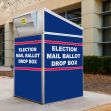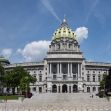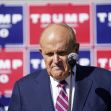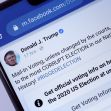In a case that challenged a 2019 Pennsylvania statute that permits no-excuse absentee voting, Pennsylvania representative Mike Kelly and seven other Trump supporters sued the Commonwealth on the grounds that the mail-in voting in last month’s election was unconstitutional. They argued that altering the existing election law (which allowed for absentee voting only under certain specific circumstances) ought to have been done by constitutional amendment rather than legislative action. Thus the mail-in votes cast were illegal, and, as such, ought not to have been counted. Alternatively, as noted in the Pennsylvania Supreme Court’s ruling rejecting the challenge, “petitioners advocated the extraordinary proposition that the court disenfranchise all 6.9 million Pennsylvanians who voted in the General Election and instead ‘direct the General Assembly to choose Pennsylvania’s electors.'”
Although a lower court did grant a preliminary injunction in the case, the injunction was appealed by the Commonwealth and the suit was dismissed with prejudice by the Pennsylvania Supreme Court on November 28, “based upon Petitioners’ failure to file their facial constitutional challenge in a timely manner. Petitioners’ challenge violates the doctrine of laches given their complete failure to act with due diligence in commencing their facial constitutional challenge,” wrote the court.
Following that shipwreck, Kelly and his co-plaintiffs took the case to the U.S. Supreme Court and filed an emergency application for an injunction barring Pennsylvania officials from certifying the election. (This despite the fact that the election had already been certified on November 24.) The application sought to bring two questions before the Court:
(1) May a legislature violate its state constitution’s restrictions on the lawmaking power when enacting legislation for the conduct of federal elections pursuant to Article I, § 4, and Article II, § 1 of the U.S. Constitution?;
and
(2) Did the Pennsylvania Supreme Court violate Petitioners’ rights under the First and Fourteenth Amendment of the U.S. Constitution by dismissing with prejudice the case below, on the basis of laches, thereby foreclosing any opportunity for Petitioners to seek retrospective and prospective relief for ongoing constitutional violations?
The first question fails to bring a brilliant legal challenge to the Pennsylvania election, not least because of the issue of laches raised by the state Supreme Court: more than a year elapsed between the passage of the statute allowing mail-in voting and the November 2020 election. Waiting until after the election, not liking the result, and only then suing on constitutional grounds ought indeed to fall under the heading of laches. Moreover, plaintiffs’ timing betrayed a concern for the outcome of the election, and not for the health of the Pennsylvania constitution.
In addition to the problem of laches, bringing the case before the U.S. Supreme Court created considerable problems of jurisdiction. The U.S. Constitution places the means of conducting elections firmly in the states’ hands, and the U.S. Supreme Court is not the arbiter of what is and what isn’t constitutional in matters of Pennsylvania state law. That job belongs to the Pennsylvania Supreme Court, or, indeed, elsewhere in the Pennsylvania court system.
Pennsylvania Chief Justice Thomas Saylor’s statement concurring in part and dissenting in part with the court’s decision, which was filed following the dismissal of the case, suggested that the suit might not even have belonged with the state Supreme Court in the first place. According to Justice Saylor, “far too much nuance is lost by treating every election matter as exigent and worthy of this Court’s immediate resolution. In this respect, I would honor the Commonwealth Court’s traditional role as the court of original and original appellate jurisdiction for most election matters.”
The second of the two questions asked in the U.S. Supreme Court petition rests upon the idea that “the Pennsylvania Supreme Court’s application of laches was erroneous and is subject to review by this Court because significant federal interests are at issue.” The petitioners maintain that they “did not hedge their bets, they simply brought an action within mere days of gaining enough information to know that they had been harmed by an unconstitutional election” and that “they did not know, nor could they have been reasonably expected to know, that they had viable legal claims well-before the election occurred.” The argument might be taken out of Gilbert & Sullivan. While such a stance might be justified with regard to election fraud, which does require that an election has taken place, the constitutionality claims the applicants sought to bring are not dependent on any election.
In his own concurring statement, Pennsylvania Justice David Wecht actually does bring up the question of voter fraud, something which, if it could be proven, would make the horse behind which Kelly and his co-plaintiffs were attempting to shut the barn door one of a very different color. Justice Wecht wrote, “to annul an election in this Commonwealth ‘requires proof of fraud or other unlawful practices of such magnitude and so interwoven with the casting and counting of the votes as to obviously deprive the election returns of all validity.'”
Ironically, despite the President’s oft-repeated claims that election fraud has taken place, the Kelly suit “failed to allege that even a single mail-in ballot was fraudulently cast or counted.” Justice Wecht’s statement establishes that the only way to justify disfranchisement of any of Pennsylvania’s voters would be through incontrovertible proof of massive fraud, whereas Kelly brought a constitutional suit, and that a day late and a dollar short. Evidentiary claims notwithstanding, the President seems to grasp these matters better than those advocating for him in court.
Indeed, the U.S. Supreme Court appears to be of the same opinion. The Court’s ruling Tuesday on Kelly’s emergency application was terse, to say the least: “the application for injunctive relief presented to Justice Alito and by him referred to the Court is denied."






